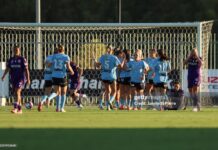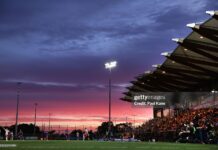
The recent appointment of Alex Epakis marks a departure from Perth Glory’s previous record of using home-grown coaches. Bobby Despotovski, Jamie Harnwell, John Gibson and Nicola Williams had all either played or coached in WA before taking on the role, so this is breaking new ground for the club.
We sat down with Epakis to find out a little more about the man who has been charged with bringing silverware to the club.
Can you give us a brief rundown of your background from playing days to your coaching career?
I stopped playing at the age of 21, 22. I was playing in the NSW NPL and I started to realise early on that if I wanted to be involved in the game at the highest level, it wasn’t going to be as a player. I was studying Health Science at the time and did a Masters in Sports Coaching and I made the decision to start coaching and enrolled in my first coaching licence.
My mindset was, “I want to accumulate as much practical experience and theoretical knowledge through tertiary study and coaching courses so that I can be the most rounded coach I could possibly be.” I became invested in learning about coaching pedagogy and sport science aimed at being the best coach I could be. I still have this desire, and I am still learning every day in all aspects.
I then had an opportunity to work as a youth coach within the Sydney FC boys academy, and after some time involved there I had the opportunity to move to Sydney University SFC within the women’s program, and the Canberra United as an assistant coach. Everything from then on has been quite a whirlwind. I took over as head coach at Sydney University WNPL three seasons ago – and it was a fantastic experience and a really enjoyable and integral part to my coaching and life to date. Now, through that, I have been fortunate to get the opportunity here at Perth Glory and I am hoping that my learning and development to date will set me up to ensure I can give the best version of myself to the club, players and members.
What attracted you to want to coach Perth Glory and how much of an influence did Terry McFlynn have on your decision?
Perth Glory is a historic club within the Australian football landscape in both the women’s and men’s game. Their success and history speak for itself. Some of my earliest recollections of Australian football is the iconic logo and name. Despite not being from Perth I have always been an avid Australian football supporter, and without a doubt, Perth Glory has a big place in the local game. In particular, the W-League side has historically been competitive and has been one of the standout clubs over the course of the women’s competition.
This made the attraction to the club very simple and easy. I wanted the opportunity to be part of the next phase in the club’s journey and really help the team and club make a big mark in the women’s game. Perth has some very highly regarded younger players coming through the NTC program, as well as some fantastic senior leaders and personalities. The project has so much potential and it was something I was very much wanting to be a part of.
I knew Terry McFlynn and Tony Pignata from my time at Sydney FC. Both are fantastic people and have served the game incredibly well. I believe they knew my character and my work ethic from our previous time together. Having their support was a core factor in the decision to come over.
You had a spell as an assistant coach with Canberra United in the W-League in the 2017-18 season. What are the biggest differences between the W-League and the NPLW from a coaching perspective?
I was very fortunate to work under Heather Garriock as an assistant, firstly at Sydney University and then at Canberra United. I learnt a lot from her and she no doubt has had an influence on my coaching to date. After that, I became the Head Coach at Sydney University – as Heather stayed in Canberra full time – and between 2018 to 2020 I was very fortunate to be the head coach at Sydney University. I had the opportunity to work within a great club that really set the bar in the NPL scene within Australia. The players and support staff where exceptional.
In my opinion, the W-League and NPLW have similarities and differences. A lot of the current W-League squads are going to be made up from NPLW players, so the understanding and knowledge between player to player and team to team shouldn’t really shock anyone. A key difference is the length of the season; only having twelve rounds means that a team that builds momentum and can harness that for a few games can really make a strong push for finals. Each weekend’s results can have big changes on the table, so it’s important to ensure that you attack every competition game like a final, whereas in a typical NPL season you play close to 22-24 fixtures plus finals.
Given that the season start is a little over a month away, and that you will have to go into quarantine for 2 weeks after you arrive in Perth, what do you think will be the most important thing you will have to work on to have the players ready for the 1st game?
We need to be ready to compete in round one as best we possible can – no excuses. It’s certainly a challenge me being in quarantine and missing a part of the pre-season, but I have full trust in the support staff and players that they will set their own high standards and prepare as best as possible. I will work closely with the staff and player’s via Zoom et cetera to ensure they are prepared and ready for round one. I expect us to certainly build our playing style and understanding as the season progresses, but we have to move quickly and be ready to go from the start of the competition.
With regards to the makeup of the squad, have you had any say in player recruitment at all, or are you inheriting a squad that has been selected for you?
Given the timing in which I have been announced as the coach, the club did their due diligence and had recruited certain players, with very much a local focus. I still have positions to fill, and I want the team to be dynamic with a great mix of young players with great ability and some more experienced players who can really set the standards. I am really looking forward to working with the players!
A recent article in The Guardian highlights the lack of game playing minutes for W-League players compared to other professional leagues. This obviously impacts player development, so what do you think can be done to improve player development?
In an ideal world, the W-League would be a much longer season and that means more opportunities and games for the countries best players to play against the best. This would of course be the best solution to improve player development. I am a big believer that we need to be innovative in our approach to ensure that our local players have the best chance of reaching the level they are capable of.
Glory have stated that they want to see a team based around WA players. This means that more local players need to be developed to W-League level. What role do you think you and Perth Glory have to play to make this happen.
I am really excited to have the opportunity to play a part in the development of the WA players. I am aware that we have a lot of young players coming through the NTC, Junior and Young Matilda’s programs, as well as other players within the NPL competition. Most of my experience to date has been involved with working with younger age brackets players and helping them transition and be ready to compete within a senior level. I and the club have to be sure we manage this process appropriately and safely. But, I am committed to having a youthful side and giving players an opportunity to compete. I believe myself and the club can really play a big role in transitioning players into the senior environment which will hopefully put us in a great position to build something that can generate sustained competitiveness and success.






